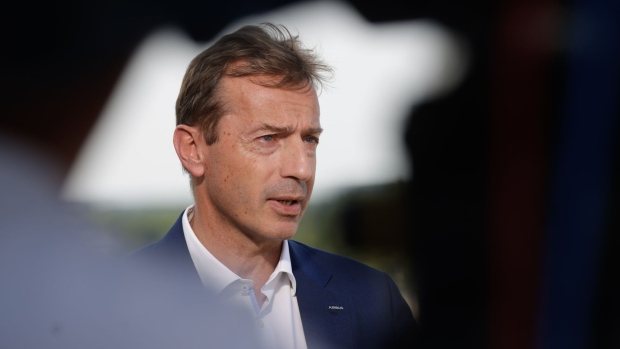Sep 23, 2022
Airbus Clings to Jetliner Delivery Goals Amid Supplier Crisis
, Bloomberg News

(Bloomberg) -- Airbus SE Chief Executive Officer Guillaume Faury reaffirmed the company’s production targets even as supply-chain constraints limit its ability to deliver jetliners on schedule.
While Airbus is grappling with “multiple crises,” including soaring inflation and energy costs, higher interest rates and uncertainty around the war in Ukraine, supply-chain issues present its biggest single challenge, Faury said Friday.
Nonetheless, Airbus is standing by plans to build 75 of its flagship A320-family aircraft a month by 2025, 25 more than it expects to be handing over by December, Faury said in a capital markets day briefing. It’s also sticking with a reduced target of 700 deliveries across its jetliner range this year.
Airbus cut its 2022 delivery goal along with the pace of the short-term ramp-up in July as suppliers struggled with labor and raw-material shortages, affecting the flow of everything from electronics to engines, while standing by the 2025 forecast. Even after reining in its ambitions for this year, the firm still had close to half its targeted handovers outstanding at the end of August.
“Based on the visibility we have now from the supply chain we think it’s manageable, but I will not tell you that it’s easy,” Faury said of the 700-plane goal. “There’s a hell of a lot of work to be done.”
The CEO said the supply crunch is “not just an end of the year battle” but a crisis that will persist into next year, if not beyond.
‘More Difficult’
“We don’t know exactly when the position of the supply chain will have normalized,” he said. “We have indications that things are starting to go better, but we are in a ramp up, so it’s not just fulfilling the needs of today. It becomes more and more difficult every day.”
The bottleneck in engines, at least, has eased somewhat, with the number of completed narrowbodies lacking turbines cut to single figures in recent weeks from 26 in July after a spate of shipments, Faury said. He added that Airbus has reached accords on engine volumes for 2023 and 2024 with both Pratt & Whitney and CFM International, and is beginning to discuss 2025 numbers.
Some suppliers have pushed back on the fast pace of Airbus’s single-aisle ramp up, with Greg Hayes, CEO of Pratt parent Raytheon Technologies Corp., saying last week that a monthly rate of 65 by 2025 is more likely than 75.
Faury said the comments were “unhelpful” and that engine makers have accepted the 2025 target, however challenging.
Other insights from the CMD briefing:
- Faury sees strong case for a stretched A220-500 version of its smallest jet series in order to offer “a powerful product range,” but says it’s too early to make a decision. The program, acquired from Bombardier Inc., should reach breakeven mid-decade.
- Airbus sees largest single-aisle A321 making up 70% of A320-family order backlog from 60% now as monthly production of jets reaches 75. A321 XLR close to service entry, somewhat later than intended.
- Wide-body interest building “slowly but surely,” says Faury, though relies on global markets. “There’ll be a moment where wide-body orders will come big time and that’s probably not very far out.”
- Airbus sees strong demand for potential freighter versions of A321 and A330. It won’t necessarily do both, but looking at opportunities.
- Faury aiming to pay dividends at the higher end of targeted range. A share buyback is also an option once a 10 billion-euro ($9.7 billion) net cash goal is reached, which could be quite soon.
- Airbus still using Russian titanium supplier VSMPO as not subject to sanctions. While working to move to alternative sources, a world minus Russian titanium would be a “pure lose-lose” for everyone.
(Updates with other highlights from CMD starting in 11th paragraph.)
©2022 Bloomberg L.P.


